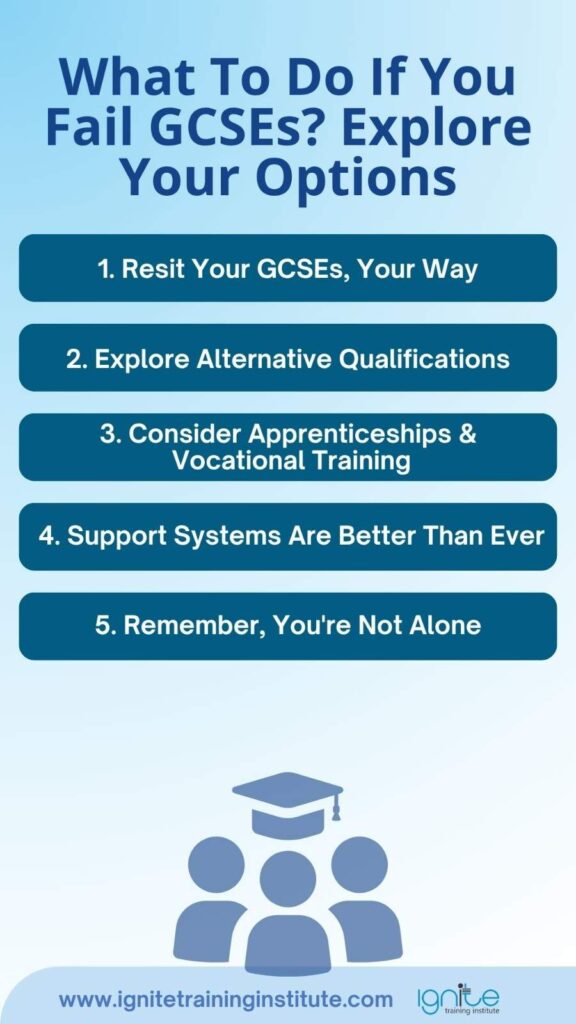Getting your GCSE results can be an emotional experience, and if the grades aren’t what you hoped for, it’s easy to feel disappointed or uncertain about the future. But here’s the truth: failing your GCSEs isn’t the end of your journey.
In fact, many students go through the same challenge every year and still find successful paths ahead. The education system today offers several ways to recover, rebuild, and move forward with confidence.
At Ignite Training Institute, we believe that every setback is an opportunity to learn and grow. As one of Dubai’s leading tutoring institutes, we’ve guided countless students through GCSE, subject improvements, and academic transitions with the best GCSE tutors.
Table of Contents
How Is Failing GCSEs Isn’t The End In 2025?
Failing a GCSE can feel overwhelming, but in 2025, it’s important to understand that it’s not the end of your academic or career journey. Many students face challenges in certain subjects, and there are structured pathways to help you move forward.
If you score below a grade 4 in key subjects like maths or English, you will usually need to retake them. But this isn’t a dead-end, there are multiple options to get back on track.
You could resit the exams, retake the full course, or explore functional skills courses that focus on essential practical skills. There are also alternative qualifications or apprenticeships, which allow you to gain hands-on experience while continuing your education or training.
For subjects where you achieve a grade 4 or above, that is considered a pass. Most colleges, sixth forms, and universities generally require five GCSEs at grade 4 or higher, including English and maths. If you meet this threshold, you can usually progress to the next stage of your education without any hindrance.
It’s worth noting that some A-Level courses have specific entry requirements. For example, you might need a grade 4 in geography to study it at A-Level, or a grade 5 or higher in chemistry to pursue A-Level chemistry.
Similarly, A-Level physics often requires at least a grade 5 in maths. If you’re unsure about the requirements, it’s always best to check with your chosen college or school to understand what grades you need for the courses you want to pursue.
In addition to subject-specific grades, some colleges or sixth forms may also ask for certain combinations of GCSE subjects or expect higher overall scores if the program is competitive.
The key takeaway is that failing a GCSE is not the end. With the right support, guidance, and planning, you can retake exams, explore alternative pathways, and continue building toward your academic and career goals. Seeking advice from teachers, tutors, or educational counselors can make this process smoother and help you stay on track.
Related: How Important Are GCSEs For University & Jobs?
What To Do If You Fail GCSEs? Here’s Your Options
Failing your GCSEs can feel like a major setback, but it’s important to remember that it doesn’t define your future. In 2025, there are more pathways than ever to continue your education, build your skills, and pursue your career goals.

1. Resit Your GCSEs, Your Way
If you didn’t achieve a grade 4 or above in subjects like English or Maths, you’ll need to continue studying these subjects until you pass or turn 18. However, there are flexible options:
- Resit in School or College: Many institutions allow students to retake GCSEs alongside other courses.
- Private Candidate: Study independently and sit exams at an approved exam center. This option offers flexibility and control over your study schedule.
- Online Learning: Platforms like CloudLearn offer online GCSE courses with year-round enrolment, allowing you to start studying within 15 minutes of signing up.
2. Explore Alternative Qualifications
If traditional GCSEs aren’t the right fit, consider these alternatives:
- Functional Skills: Equivalent to GCSEs, focusing on practical skills in English, Maths, and ICT.
- BTECs: Vocational qualifications that combine practical learning with theoretical content.
- Entry-Level Certificates: Designed for students who are not yet ready for GCSEs or other Level 1/2 qualifications.
3. Consider Apprenticeships & Vocational Training
Apprenticeships offer a combination of work experience and formal education, allowing you to earn while you learn. Many employers value practical skills and enthusiasm over academic qualifications. Additionally, vocational training programs can provide specialized skills in various fields.
4. Support Systems Are Better Than Ever
If you’re unsure about your next steps, talk to your school, college, or a career advisor. They can provide tailored advice and help you explore options that align with your interests and strengths.
With tutoring, study apps, and support programs, students today have more resources than ever to bounce back. Platforms like Ignite Training Institute offer personalized support for students who need extra guidance in core subjects. Getting help early can make the next attempt much more successful.
5. Remember, You’re Not Alone
Many successful individuals faced academic challenges early in their lives. Your GCSE results are just one part of your journey. With determination, support, and a proactive approach, you can overcome this hurdle and achieve your goals.
Related: 10 Proven Strategies On How To Study For IGCSE Exams & Excel
How To Plan Your Way Forward? Start Acting Early
Once you receive your GCSE results, whether they’re what you hoped for or not, the next step is to start planning your way forward as early as possible. Acting quickly helps you stay focused and ensures you don’t lose valuable time in making progress toward your future goals.
Begin by reviewing your results carefully and identifying which subjects you need to improve on. If you’ve missed a grade 4 in English or maths, speak to your teachers or school advisor about resit opportunities. Many colleges and training centers also offer support programs that help students prepare for retakes alongside their next level of study.
It’s also important to reflect on your goals, what do you want to do next? Whether you’re aiming for A Levels, vocational courses, apprenticeships, or other qualifications, having a clear plan will help you make confident decisions. Talk to your school’s career advisor, teachers, or family about your interests and strengths. They can guide you toward the most suitable path.
If you plan to retake GCSEs, set a structured study plan early on. Don’t wait until deadlines approach, use the time to rebuild your understanding of difficult topics and work on your weak areas. You can also seek extra tutoring or online support to stay consistent and motivated.
Remember, success isn’t about never failing, it’s about how you respond when things don’t go as planned. By acting early, staying proactive, and seeking the right guidance, you can turn your setback into a comeback and keep moving toward your academic and career goals with confidence.
Related: Top Universities That Accept IGCSE Certificate In USA & UK
Ignite Training Institute – GCSE Tutors In Dubai, UAE For Academic Support
At Ignite Training Institute, we understand that the GCSE years can be challenging, but with the right guidance, every student can reach their true academic potential. Our team of experienced GCSE tutors in Dubai provides personalized tutoring support across all major subjects, helping students strengthen core concepts, build exam confidence, and achieve their target grades.
As one of the leading tutoring institutes in the UAE, Ignite combines expert teaching with tailored learning plans that adapt to each student’s pace and learning style. Our goal is not just to help students pass their exams, but to help them understand, retain, and apply what they learn, setting a strong foundation for A Levels, IB, or any higher education path they choose.
FAQs
1. What happens if I fail GCSEs in 2025?
If you fail one or more GCSE subjects, especially English or maths, you’ll usually need to retake them. Many schools, colleges, and training centers offer resit opportunities or functional skills alternatives to help you meet the required grade and move forward academically.
2. Can I still go to college if I fail my GCSEs?
Yes, many colleges offer foundation or vocational courses that don’t require high GCSE grades. You can also retake your failed subjects alongside your new course. It’s best to check the entry requirements of your chosen college early.
3. Do I have to retake both English and maths if I fail?
If you score below a grade 4 in English or maths, you’ll need to retake those subjects, as they’re essential for most academic and career pathways. However, you can pursue other subjects or qualifications at the same time.
4. Can I take A Levels if I didn’t pass all GCSEs?
To take A Levels, most schools and colleges require at least five GCSEs at grade 4 or above, including English and maths. Some A-Level subjects also have specific grade requirements, for example, you might need a grade 5 in maths to study physics.
5. What are functional skills courses, and how are they different from GCSEs?
Functional skills courses focus on practical English and maths skills needed for work or further education. They’re a great alternative if you struggle with traditional GCSE exams but still want to improve your employability or meet entry requirements.
6. How can I prepare for GCSE resits effectively?
Start early by identifying weak areas, revising consistently, and seeking support from tutors or online resources. Institutes like Ignite Training Institute in Dubai offer personalized GCSE tutoring to help students regain confidence and improve their performance in retakes.
7. How do employers see failed GCSEs?
While some employers, especially in competitive fields, may look for passes in key subjects like English and maths, most value skills, attitude, and experience just as much as grades. If you’ve struggled academically but show determination, reliability, and a willingness to learn, employers often appreciate that effort.
Plus, gaining additional qualifications, vocational training, or work experience can help you stand out even without perfect GCSE results.
Conclusion
Failing your GCSEs may feel like a major setback, but in reality, it’s just a detour, not a dead end. Education today offers multiple pathways to get back on track, whether through resits, alternative qualifications, or practical learning routes. What matters most is how you respond, plan your next steps, and stay motivated to keep moving forward.
Related: The Beginner’s GCSE Guide: Everything You Need to Know





